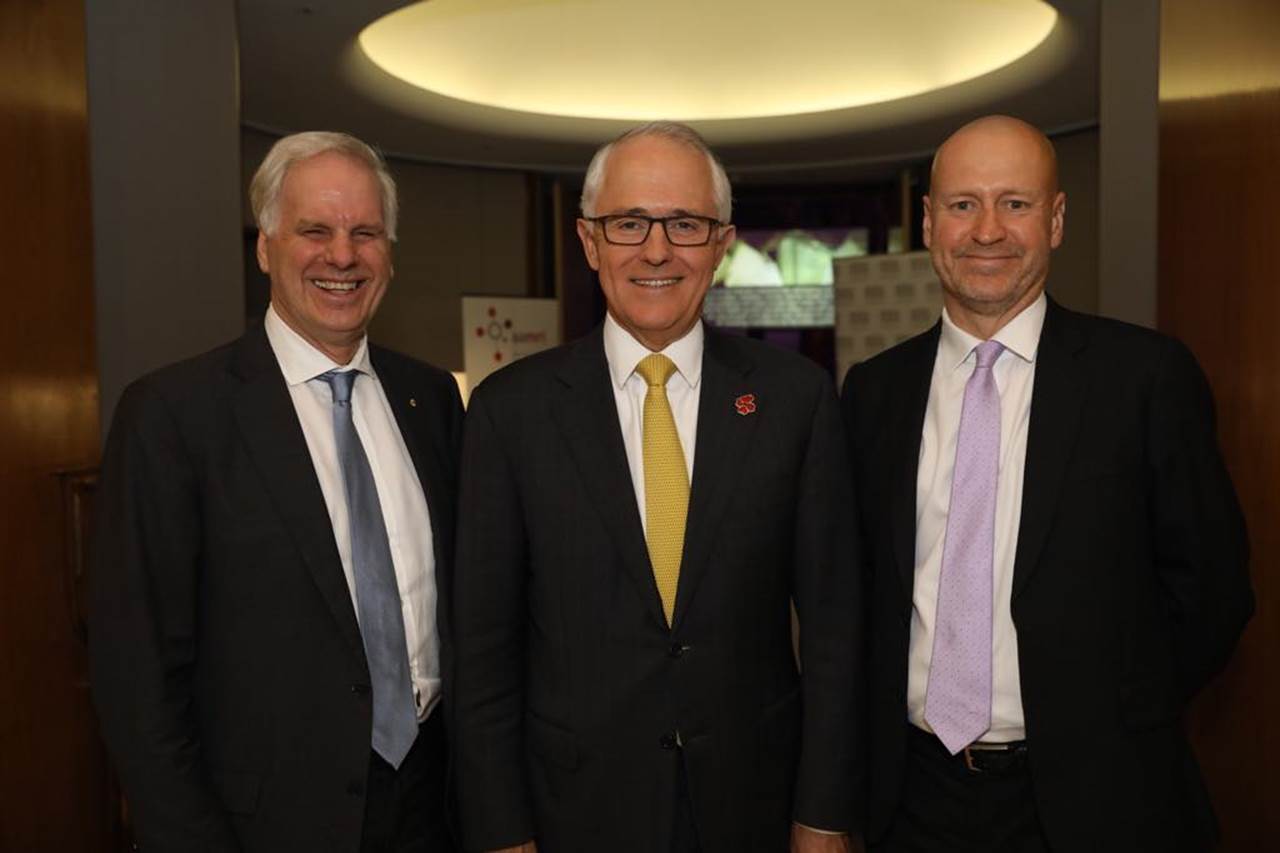November 10, 2016 Print
Fighting for the full funding and implementation of the Medical Research Future Fund and keeping Australia’s best and brightest medical researchers and clinicians onshore for the health of the nation will be at the top of Professor Tony Cunningham’s agenda as the new President of the Association of Australian Medical Research Institutes (AAMRI).
 (L-R) New AAMRI President, Professor Tony Cunningham, with Prime Minister Malcom Turnbull and immediate past AAMRI President Professor Doug Hilton.
(L-R) New AAMRI President, Professor Tony Cunningham, with Prime Minister Malcom Turnbull and immediate past AAMRI President Professor Doug Hilton.
Speaking at his induction at the AAMRI annual dinner at Parliament House, Professor Cunningham said the Medical Research Future Fund (MRFF) is a once-in-a-generation opportunity for improved health and economic outcomes for Australia.
“We congratulate the Government on delivering on their commitment to this nation-shaping fund, as they continue to add to the MRFF and help it grow to its $20 billion target by 2021, at which point it will disburse $1 billion per year and effectively double government investment in health and medical research,” said Professor Cunningham.
Professor Cunningham, who is the Executive Director of the Westmead Institute for Medical Research, also welcomed the launch at the dinner of the Australian Medical Research and Innovation Priorities 2016-2018 by Prime Minister Malcolm Turnbull and Health Minister Sussan Ley.
“This is a giant leap forward for the medical research sector,” he said. “More than half of all Australians live with a chronic medical condition, and we’re looking down the barrel of a doubling in health and aged care costs to the taxpayer in coming years. The only way we are going to get on top of these problems is by investing in health and medical research to get at the causes, and hopefully even prevent these conditions.”
“Taking the MRFF from an exciting concept to a game-changing opportunity will ultimately save lives, and save on health care costs in the future.”
Professor Cunningham, a clinician scientist, is also passionate about ensuring that Australian discoveries are translated into better treatments that benefit all of the community, particularly our most chronically ill and disadvantaged.
“Australia, like many western countries, faces the grand challenge of ensuring medical advances derived from research are translated into new drugs, vaccines, diagnostics and treatments widely available to the whole community without bankrupting the nation,” Professor Cunningham said.
“We have some exceptionally bright people working in health and medical research in Australia. Just recently our researchers have come close to a cure for some anaphylactic food allergies, developed more effective cancer drugs and have helped some type 1 diabetics throw away their insulin through successful islet transfers. This is all life-changing research for the beneficiaries.”
Professor Cunningham said the medical research community was eagerly anticipating the first grants to be disbursed from the MRFF later this financial year.
”Keeping our brightest researchers here and better translating discoveries into improved healthcare will enhance the lives of all Australians, including the disadvantaged, and improve access for discoveries to us all. We must ensure the best medical treatments are available to everyone, not just the wealthy.”
Professor Cunningham said that AAMRI was a broad church, representing the full spectrum of the health and medical research sector.
“That means everything from discovery research to better understand diseases, through to prevention, clinical trials, population studies, and health services research in our hospitals and other healthcare settings,” he said.
“As AAMRI President I will continue to pursue a more efficient peer review system, full and transparent funding for research, and a better deal for our early and mid-career researchers.”
Professor Cunningham officially commenced as AAMRI President on November 10, taking over from incumbent President Professor Doug Hilton, Director of the Walter and Eliza Hall Institute, who has been in the role for two years.